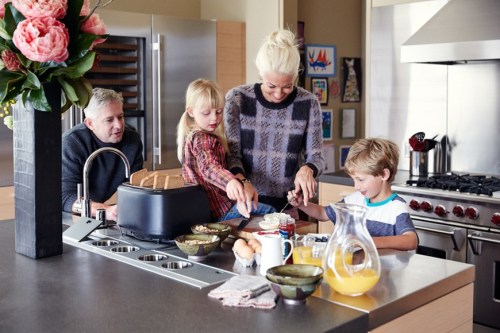Our editors independently select these products. Making a purchase through our links may earn Well+Good a commission
Is it healthy to raise your kids vegan?
Do vegan kids get all the nutrients they need? A pediatric nutritionist weighs in on whether it's healthy to raise kids with a plant-based eating plan. Plus, tips for cooking meat when you're a vegetarian.


Deciding to go vegan is usually catalyzed by strong opinions, be they about animal rights, the environment, or your what’s best for your health. So it naturally follows that you’d want to raise your kids in accordance with your philosophy. But are growing bodies going to get all the nutrients they need without animal products?
To find out, I tapped pediatric nutritionist Mandy Sacher, whose new book The Wholesome Child answers quite possibly every dietary question you may have. (It also has over 140 recipes.) Sacher, who has devoted her career to ensuring parents are armed with the right info to raise healthy, eager eaters, cautions parents to think twice before starting their kids on a plant-based diet.
“Adults can take a chance with different diets and be okay,” she says. “If something doesn’t work for you, maybe you’ll feel lethargic, but you’ll soon realize you aren’t functioning properly. With children, the rate of growth and the nutritional needs in those first few years is really huge. It’s very hard for them to get all the fuel and energy they need purely from a vegan diet.”
Sacher says iron and B12 in particular are nutrients children need that primarily come from meat. “Spirulina and nutritional yeast do have B12, but not enough,” she says. “Also, there are non-animal sources of iron, but you need to make sure it’s being absorbed, so pairing it with vitamin C is very important.”
But how exactly do you raise a meat eater when it’s not on your own menu? Here, Sacher shares some helpful tips.

Pay attention to how you talk about food
Because you’re shaping a young mind as well as a young body, Sacher says it’s important to be deliberate in the way you talk about food. “I always encourage parents to talk about the amazing things vegetables do for us instead of approaching it as giving a whole list of foods that are ‘bad,'” she says.
She explains that talking negatively about foods can cause hangups or disordered eating down the road. “As [your kids] get older, they may want to experiment with eating more things,” Sacher says. But if they’re worried you won’t approve, “they either feel bad about it and hide it from the parents, or they could develop a negative attitude toward food.” So instead of vilifying certain food groups, her advice is to crowd it out by talking about how great other foods—like veggies, fruits, and whole grain—are.

Have someone else prepare the meat when possible
Sacher says children really only need one to two palm-sized servings of meat a week, so it’s not like you have to start loading your fridge with beef and chicken all the time. And as far as milk goes, she says what’s most important to keep in mind is making sure your child gets enough calcium, a nutrient that’s found in many other foods including leafy greens, broccoli, nuts, and seeds.
As for those one to two times a week when meat should be on the table? Sacher recommends you delegate cooking duties if you can. “It’s important to honor someone’s cultural, religious, and personal beliefs,” she says. “Often, there are others who help care for the child, such as a grandparent, nanny, or even a family friend. That would be a good time for your child to have a meat-filled dish.” And hey, maybe you can host a meatless Monday dinner at your house to return the favor.

Go for iron-rich meat sources
When you’re starting to prepare meat at home, Sacher encourages vegan parents to start slow. “Try just once a week or whatever is manageable for you,” she says. And since you won’t be serving it frequently, she recommends getting more bang for your buck by opting for a high-iron source such as beef or lamb.
When preparing a meal, instead of making something entirely separate for your child—who has time for that anyway?—her advice is to just add the meat at the end. “If you’re making a stir fry with tofu, you can add in salmon [or chicken] to your child’s plate,” Sacher says. “Or if you’re making a lentil stew, you can use a meat broth for your child’s portion. It’s very easy to adapt a vegan recipe and add in an animal protein source at the final stages.”
Making sure your child gets all the needed nutrients doesn’t mean you have to completely abandon your fave go-to recipes or your beliefs. It just takes a bit of planning and tweaks—alas, just another way parenting demands a bit of flexibility.
For more expert and real-mom-approved parenting intel, dive into Mom Crush May.










